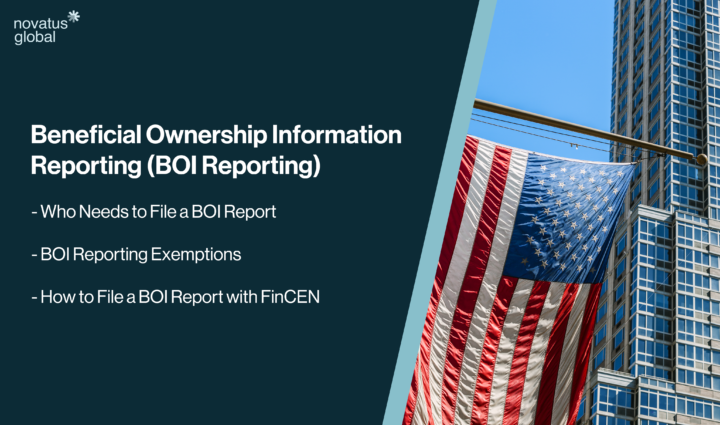
As of FinCEN website 19th Feb 2025: Beneficial ownership reporting requirements are back in effect, with a new deadline of March 21, 2025 for most companies. FinCEN will assess its options for further modifying deadlines.
Introduction to Beneficial Ownership Information Reporting (BOI)
The Corporate Transparency Act (CTA) was passed in the United States of America in 2021 and came into effect on the 1st of January 2024. This Act was passed into Federal Law and introduced the requirement for small businesses and other entities to file Beneficial Ownership Information Reports (BOI Reports). The overall goal of the CTA is to increase transparency over corporate ownership within the US financial markets and remove vulnerabilities that can be exploited for tax fraud, money laundering or other illegal financial activities.
BOI reports are filed to the US Department of Treasury’s Financial Crimes Enforcement Network (FinCEN) and provide information on the individuals who directly or indirectly control a business. It is the responsibility of the small business to file the BOI, and the information contained within is available to several stakeholders including relevant federal agencies, state and local law enforcement, the Department of Treasury and relevant foreign law enforcement agencies.
Who is Required to File a BOI Report?
According to FinCEN, the CTA states that “reporting companies” must file BOI reports, of which there are two types:
-
-
- Domestic Reporting Companies – this refers to corporations, limited liability companies and any other entities formed by the filing of a document with a secretary of state or any similar office within the United States.
- Foreign Reporting Companies – this refers to corporations, limited liability companies or any other entity formed outside of the United States, under the law of a foreign country, that is registered to do business in the United States by the filing of a document with a secretary of state or a similar office.
-
BOI reports need to be filed for any beneficial owner who:
-
-
- Has substantial control* over the reporting company
- Owns or controls at least 25% of the reporting company’s ownership interests
- Since trusts, corporations and other legal entities are not classified as beneficial owners, in specific circumstances, information about an entity may be reported instead of information on a beneficial owner.
-
*Substantial control is defined by an individual who:
-
-
- Is serving as a senior officer at the reporting company
- Has the authority to appoint or remove officers or directors from within the reporting company
- Is a keydecision-maker within the reporting company for significant business operations
- Has any other form of substantial control over the reporting company as defined in chapter 2.1 of FinCEN’s SECG guide
-
Exemptions from BOI Reporting Requirements
Publicly traded companies that meet specific requirements, certain large companies and many non-profits do not need to submit BOI reports as they have separate reporting requirements. There are 23 exemptions overall, most of which are for entities operating in industries already heavily regulated by NCAs (National Competent Authorities).
As set out in FinCEN’s BOI FAQs C.2., the following list summarises those entities that are exempt from BOI reporting:
-
-
- Securities Reporting Issuer
- Governmental Authority
- Bank
- Credit Union
- Depository Institution Holding Company
- Money Services Business
- Broker or Dealer in Securities
- Securities Exchange or Clearing Agency
- Other Exchange Act Registered Entity
- Investment Company or Advisor
- VC Fund Advisor
- Insurance Company
- State Licensed Insurance Producer
- Commodity Exchange Act Registered Entity
- Accounting Firm
- Public Utility
- Financial Market Utility
- Pooled Investment Vehicle
- Tax-Exempt Entity
- Entity Assisting a Tax-Exempt Entity
- Large Operating Company*
- Subsidiary of Certain Exempt Entity
- Inactive Entity**
-
*Large Operating Companies are exempt if they have over 20 full-time employees, gross U.S. receipts of more than $5 million and a substantial physical presence in the U.S.
**Any entity formed on or before 1st January 2020, not engaged in active business, with no ownership changes or financial transactions exceeding $1,000 in the last 12 months classifies as an Inactive Entity and is exempt from BOI reporting obligations.
What Information Must Be Provided in a BOI Report?
BOI reports include information about a business such as the identity of the beneficial owner and their personal details, as well as information about the reporting company.
The information required for the reporting company includes:
-
-
- Legal name (including any alternative names used)
- Form of identification (tax identification number and a copy of ID used to obtain tax ID number)
- Jurisdiction of reporting company (or jurisdiction of first registration)
- S. address of reporting company
-
Information required to identify the individual beneficial owner is as follows:
-
-
- FinCEN ID (optional – obtained by registering with FinCEN, which can be used to simplify the reporting process by reducing the amount of information required on future submissions)
- Legal Name & D.O.B
- Residential Address
- Form of Identification
-
How to File a BOI Report with FinCEN
Companies required to file BOI reports can do so using FinCEN’s online portal, which is free of charge and typically takes no longer than 20 minutes per report. This can be accessed through the FinCEN e-filing website and there is a section for BOI reporting. Companies who do not already have a FinCEN ID can request one through this site also.
Alternatively, for a hands-off approach, BOI reporting can be delegated to a third party, which can help ensure your BOI report’s accuracy and timeliness. Delegated BOI reporting is most beneficial for companies that have complex ownership structures since submissions become technical and increasingly time-consuming when this is the case.
When Do BOI Reports Need to Be Submitted/Resubmitted
Initial BOI reports are required for all companies that are not exempt from reporting. For companies that existed before the 1st of January 2024, initial BOI reports must be submitted by the 1st of January 2025.
Companies that were registered on or after the 1st of January 2024 have 90 calendar days from receiving notice that the registration/creation is active to file their initial BOI report. And for companies registered on or after the 1st of January 2025, they will have 30 calendar days to file their initial BOI report.
After initial BOI Reports have been submitted, there is no requirement to resubmit unless previously submitted information needs to be updated or corrected. If a change is required to a BOI report, any inaccuracies must be updated within 30 calendar days.
Penalties for Noncompliance
Penalties for non-compliance with BOI reporting standards can be costly for companies. FinCEN states that enforcement efforts will focus on “wilful violations of the BOI Reporting requirements, not minor or inadvertent errors” and several monetary penalties are outlined in the CTA. These penalties start at $500 per day but have been adjusted each year for inflation, and up to $10,000 in total fines and non-monetary penalties (up to two years in prison) can be dealt to parties found to have willingly violated BOI reporting requirements.







